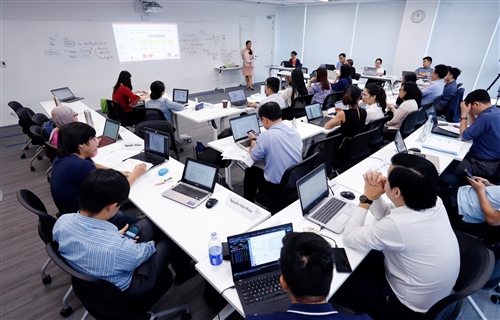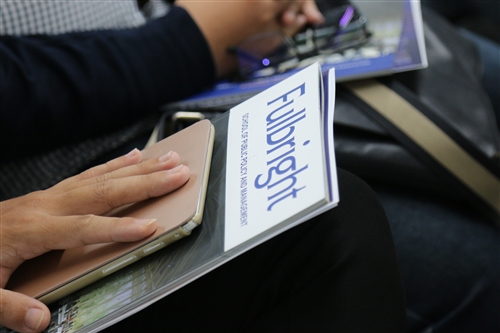A knowledge initiative pioneered by Fulbright, Open Courseware is a public resource with learning and research materials published online for public access. In line with Fulbright’s values of shared knowledge, the early 2000s saw Fulbright School build Open Courseware from scratch to benefit not only Fulbright learners and graduates, but also the broader Vietnamese society.
At the time, the internet was not as widespread in Vietnam as it is today. Users had to dial in using their phone connection, which suffered from rather slow speeds. In many corners of the country, Internet cafes opened where users could pay for better and faster access instead of their sluggish home connection. To many users in Vietnam at the time, Internet was only for news, games and some limited personal communication, with even emails seeing limited use. However, leaders at the Fulbright Economics Teaching Program, precursor to the current Fulbright School of Public Policy and Management, saw the great potential in harnessing the Internet to build a digital platform for educational purposes.
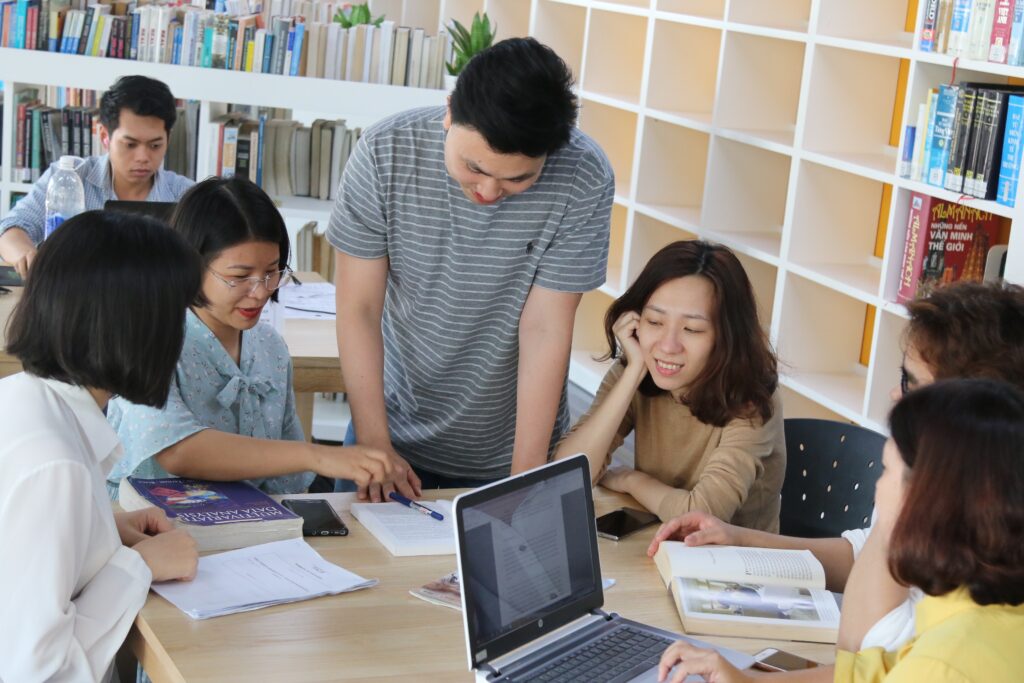
Up-to-date and free access is the motto of Fulbright Open Courseware.
In late 2002, FETP sent one of its managers, Mr. Truong Si Anh, an expert from HCMC’s Institute of Economic Research boasting a great depth of experience in international cooperation projects and a master graduate from the Asian Institute of Technology, Thailand, to Massachusetts Institute of Technology, U.S. Mr. Anh was assigned with an important mission: learning how to build an Open Courseware (OCW) for Fulbright inspired by the MIT model.
As recalled by Dr. Vu Thanh Tu Anh, Senior Lecturer of Fulbright School, FETP was at the time the leading school teaching advanced market economics principles in Vietnam. FETP graduates consisted of – and still remain – a wide alumni network spread across Vietnam’s diverse landscapes. Those from big cities had a better access to the latest research and information, while learners from smaller cities or rural areas were at a disadvantage when following new trends. Fulbright’s response was to develop an online platform based on MIT’s innovative technology, and thus help our students, graduates and all other interested parties access the materials necessary for their self-study and research in economics.
Sharing Knowledge
Returning to Fulbright School from his trip to MIT, Si Anh rolled up his sleeves to tackle the designing and developing of the digital platform. Fulbright’s OCW shares many features with WhiteBoard, a software for instructors to develop highly interactive lessons and access standardized syllabi approved by well-known institutions. Based on the great advantages of WhiteBoard, Si Anh broadened the scope for Fulbright OCW, allowing instructors to integrate diverse sources for their lectures, maintaining a highly interactive environment for learners, and enabling them to track the daily updates to their reading list, lecture notes, practice exercises and case studies. Si Anh’s commitment to FETP’s OCW project continued throughout the subsequent years, even as he moved on to become the Deputy Dean of the Fulbright Economics Teaching Program.
Fulbright Open Courseware was officially launched in 2003 and rapidly became an essential component of the school’s educational activities. Course syllabi, lecture slides, reading lists, case studies and practice exercises were all published online, making OCW instrumental to FETP’s pedagogical approach. As Dr. Tu Anh recalls, the mid-2000s saw downloads soaring to one million per year, with 80,000-90,000 downloads a month on average, and the busiest months clocking at 120,000.
“Fulbright Open Courseware has been a prominent platform to share the knowledge and the academic values of Fulbright School to society, particularly to those having difficulty in accessing reference materials in times of constrained resources,” noted Dr. Vu Thanh Tu Anh.
Indeed, one of Fulbright OCW’s greatest strengths is its dedication to open access. The courseware is not meant to serve only those enrolled at Fulbright: instructors from other universities frequently download lesson plans from OCW for their use in class. Learners can tap into this vast resource for their independent study and research. On top of being freely available another guiding principle was to develop a platform where knowledge can be continuously updated. All course syllabi, lecture notes and practice exercises are uploaded, revised, and adjusted annually, keeping the learning resources from becoming obsolete the way school books are prone to do, and providing distant Fulbright graduates with a means to access the latest data and discoveries from around the world.
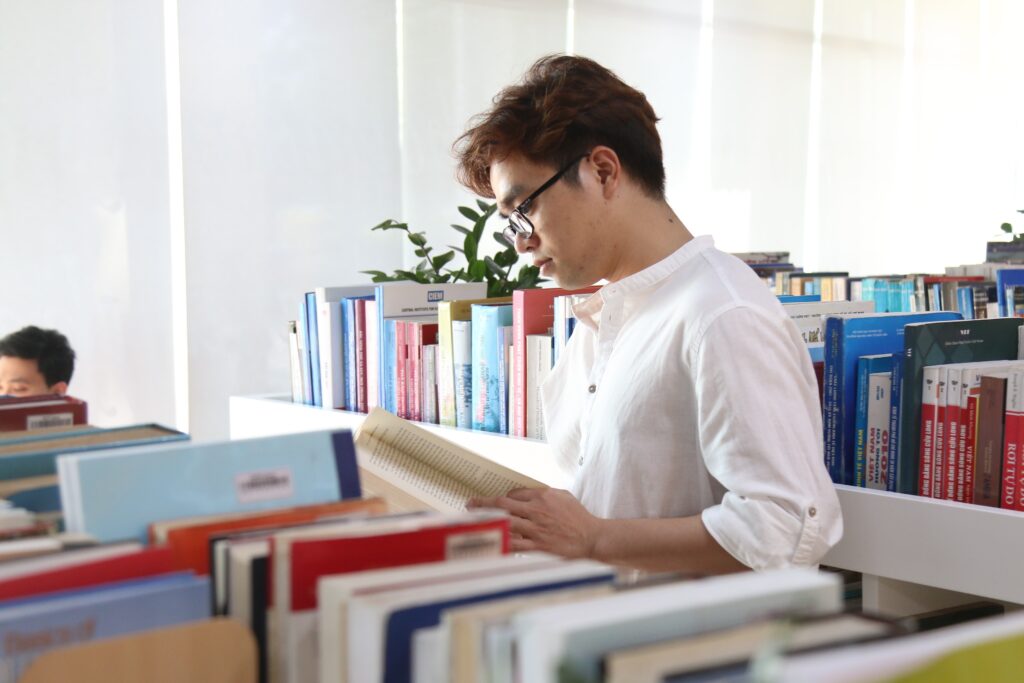
Since then, Fulbright OCW has fulfilled its objectives to extend beyond serving only Fulbright learners by becoming a valuable learning resources for the general public. Many major universities in Vietnam, including HCMC University of Economics, Nong Lam University, HCMC University of Technology, Banking University HCMC, and HCMC Open University, have relied on Fulbright courseware as a valuable reference for their curriculum in economics, finance, and policy.
Dr. Tu Anh remarks that “many universities have looked to our syllabus, lectures and readings uploaded on OCW for their inputs. Fulbright Open Courseware has already had a lasting impact in suffusing the academic values of Fulbright to society at large. Beyond the benefits to our students, OCW is effective in delivering quality reference materials to policy makers and researchers looking to further their understanding of economics and public policy.”
Developing new media for knowledge
From its early days as part of FETP, to today’s FSPPM, Open Courseware has been constantly developed and updated to become the platform it is today: a repository of vast resources, and an important legacy for FSPPM. Virtual versions of course syllabi, lectures, reading materials, case studies, as well as the one-year diplomacy program and executive courses are available.
Nguyen Thi Thien Trang, Master of Public Policy (MPP) class of 2021 (Policy Analysis concentration) appreciated how OCW’s comprehensive offerings enable self-study.
“The courseware delivers great educational content for learners in economics course. For prospective candidates, this platform also introduces the academic approach and educational philosophy of Fulbright.”

Student Nguyễn Tuấn Anh (right)
On a similar note, Nguyen Tuan Anh, MPP 2021 (Leadership & Management concentration) commended Fulbright Open Courseware for its diverse and public platform open to all learners, as Fulbright places no restriction to access or downloads for web users, in contrast to many foreign institutions.
“The greatest benefit of Fulbright OCW is its complimentary access and download. If you register in a U.S. program, some content is locked behind a subscription plan. In this courseware, copyrighted materials have been purchased by the school, and learners can focus on reading and learning the material without worrying about pirated intellectual property.”
Over a decade, from the early 2000s to 2010s when knowledge was available in limited forms, Open Courseware pioneered an innovative channel to share knowledge with public policy learners and practitioners. Today, with the development of virtual platforms, knowledge can reach a wider audience under more diversified forms. In this changing landscape, Dr. Vu Thanh Tu Anh saw how the significance of Fulbright OCW was not as prominent as it was during 2000s and urged the school to look for new channels to spread its resources. All materials continue to be published onto OCW accompanied by stricter intellectual property restrictions. In addition, Fulbright School is working with other institutes and learners to foster new modes of virtual learning.
“Society demands for more interactive content as opposed to static reading materials. When Open Courseware was initially developed, online interactions were not as prevalent as they are today. Nowadays, learner interactions with sources of information must be enriched using modern technological solutions. This is our school’s vision, which is why we have been experimenting with this idea for the past two years to come up with a promising new platform,” said Dr. Tu Anh.
- Xuân Linh
Related Articles

Policy Analysis – The time-honored program at Fulbright School
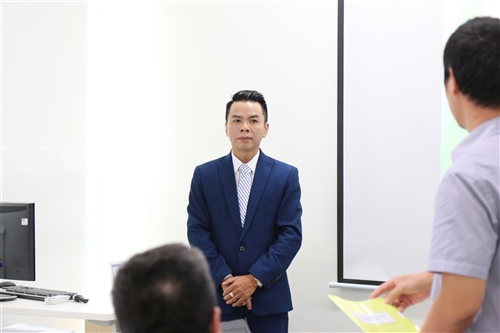
No one left behind
